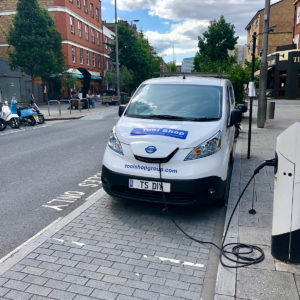The United States just reached a major milestone with more than 1 million electric vehicles now on our nation’s roads. This achievement caps a decade of work by automakers, environmental groups, electric companies and other stakeholders to expand electric transportation options and the associated EV charging infrastructure.
While it took years to get to this point, the rise of the EV is only going to accelerate. In fact, a new report from the Edison Electric Institute and the Institute for Electric Innovation projects that more than 18 million EVs will be on U.S. roads in 2030. EEI and Natural Resources Defense Council do not agree on everything, but we do agree that spurring innovation in electric transportation is good for our environment and for customers.
As America’s cities and communities continue to seek smart, sustainable mobility solutions, electric transportation will continue to be a critical component — including EVs, electric buses, and the charging infrastructure required to support them. Simply put, electric transportation is a win for our nation, helping to meet customer needs, cut emissions and support America’s energy security.
The nation’s energy sector is undergoing a profound transformation. Electric companies are making unprecedented investments in smarter energy infrastructure, providing increasingly cleaner electricity, and expanding the energy solutions available to meet the changing needs of customers. Electrifying the nation’s transportation sector is an opportunity to leverage this transformation to cleaner sources of energy.
The environmental benefits are clear. The increased deployment of EVs, which have no tailpipe emissions, are an essential part of reducing soot and smog and improving local air quality. Importantly, increased deployment of EVs also provides significant climate benefits, as carbon-dioxide emissions from electricity dropped by more than 28 percent since 2005 and are on track to be lower than transportation for the third year in a row.
In addition to the environmental benefits, customers are increasingly reaping the economic advantages of more EVs on U.S. roads. The average cost to charge an EV today is roughly equivalent to $1.20 per gallon, a significant savings over gasoline vehicles. And, as automakers produce more vehicles and more models, the cost of electric vehicles is declining.
In addition, since they use electricity produced domestically, EVs have national security benefits because the fuel sources used to generate electricity are domestic and there is no risk of an interruption in fuel supplies from unstable nations.
As lawmakers and the administration move to develop infrastructure legislation next year, we will both be pushing to ensure that measures to get more EV charging stations built will be part of that package. It’s crucial that new infrastructure is constructed with EVs in mind. At the state level, meanwhile, we continue to advocate for swift action from public utility commissions that are currently weighing electric company EV programs.
EVs are the future of U.S. transportation. They are a benefit to customers, to the environment, and to our nation’s energy security. It is crucial that lawmakers and policymakers in Washington and state capitals recognize and act to secure those benefits.

